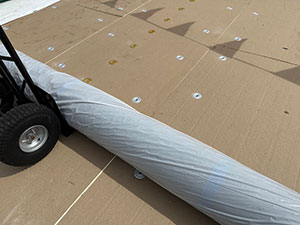Polyvinyl chloride (PVC) roofing is a popular choice for both commercial and residential buildings due to its durability, energy efficiency, and low maintenance requirements. Made from a type of plastic, PVC roofing is widely used for flat or low-slope roofs. It offers numerous advantages over traditional roofing materials, making it an excellent investment for property owners. Call A-1 Commercial Roofing Solutions (574) 536-2823 to gather more information about PVC roofing in Elkhart, IN.
What is PVC Roofing?

PVC roofing is a type of single-ply membrane made from a blend of plastic polymers. It is typically reinforced with fiberglass or polyester to add strength and improve its resistance to damage. The material is manufactured in large sheets, which are then heat-welded together to form a continuous, seamless surface. This seamless design minimizes the risk of leaks and provides superior waterproofing.
Benefits of PVC Roofing
Durability and Longevity: PVC roofing systems are exceptionally durable and can last 20 years or more with proper care. They are resistant to common roof problems like leaks, cracks, and punctures, making them a reliable option for long-term protection.
Weather Resistance: PVC roofing performs well in various weather conditions, including extreme heat, heavy rain, snow, and high winds. Its resistance to ultraviolet (UV) rays prevents it from becoming brittle or discolored over time, maintaining its aesthetic and protective qualities.
Energy Efficiency: PVC roofs are highly reflective, which helps reduce the absorption of heat. This can result in lower cooling costs for buildings, especially in hot climates. The energy efficiency of PVC roofing also contributes to its appeal in sustainability-focused building projects.
Low Maintenance: One of the biggest selling points of PVC roofing is its low maintenance requirements. The material is resistant to mold, mildew, and algae, and it typically requires only periodic cleaning to maintain its appearance and performance.
Environmentally Friendly: PVC roofing is recyclable, which is an important feature for those looking to minimize environmental impact. Additionally, its energy-efficient properties reduce a building’s overall carbon footprint.
PVC Installation

The installation of PVC roofing involves laying large sheets of the material over the roof deck, followed by heat-welding the seams to create a seamless barrier. This process requires a skilled contractor familiar with PVC roofing systems to ensure proper installation and performance. It is important to check the roof’s structure before installation to ensure that it can support the weight and design of the PVC membrane.
Maintenance and Care
PVC roofs are relatively easy to maintain. Routine inspections can help identify any minor issues before they become major problems. The roof should be kept free from debris, and any potential damage to the seams should be addressed immediately to maintain the roof’s integrity.
PVC Roofing Specialists
PVC roofing is a strong, energy-efficient, and cost-effective solution for both residential and commercial buildings. With its durability, resistance to weather elements, and low maintenance requirements, it is a smart choice for those looking to protect their property while reducing long-term roofing expenses. For PVC roofing experts in Elkhart, IN contact A-1 Commercial Roofing Solution on (574) 536-2823.
PVC Roofing FAQ
What is the lifespan of PVC roofing?
PVC roofing can last 20 years or more with proper maintenance. Its durability is enhanced by its resistance to UV rays, harsh weather, and general wear and tear, making it a long-lasting solution for both commercial and residential roofs.
Is PVC roofing energy-efficient?
Yes, PVC roofing is highly energy-efficient due to its reflective properties. It reflects UV rays and minimizes heat absorption, which can lower cooling costs for buildings, especially in hot climates. This helps reduce the overall energy consumption of the building.
Is PVC roofing suitable for all types of roofs?
PVC roofing is particularly ideal for flat or low-slope roofs. While it can be used on a variety of roof types, it is most widely used in commercial and industrial settings where large, flat surfaces are common. It is not typically used on steep-sloped roofs.
How do you install PVC roofing?
Installation involves laying large sheets of PVC membrane over the roof deck. The seams between the sheets are then heat-welded to create a seamless barrier. It is crucial that a skilled contractor performs the installation to ensure proper sealing and long-term performance.
Does PVC roofing require a lot of maintenance?
No, PVC roofing is relatively minimal maintenance. It is resistant to mold, mildew, and algae, and usually only requires periodic cleaning to maintain its appearance and functionality. Regular inspections to check for damage and debris are recommended.
Is PVC roofing environmentally friendly?
Yes, PVC roofing is environmentally friendly. It is 100% recyclable, and its reflective properties help reduce the building’s cooling costs, which lowers energy consumption. Additionally, its durability means fewer replacements, contributing to less waste overtime.
Can PVC roofing withstand extreme weather conditions?
Yes, PVC roofing is designed to withstand extreme weather, including high winds, heavy rainfall, snow, and intense heat. Its resistance to UV radiation and temperature fluctuations makes it a reliable choice for various climates.

